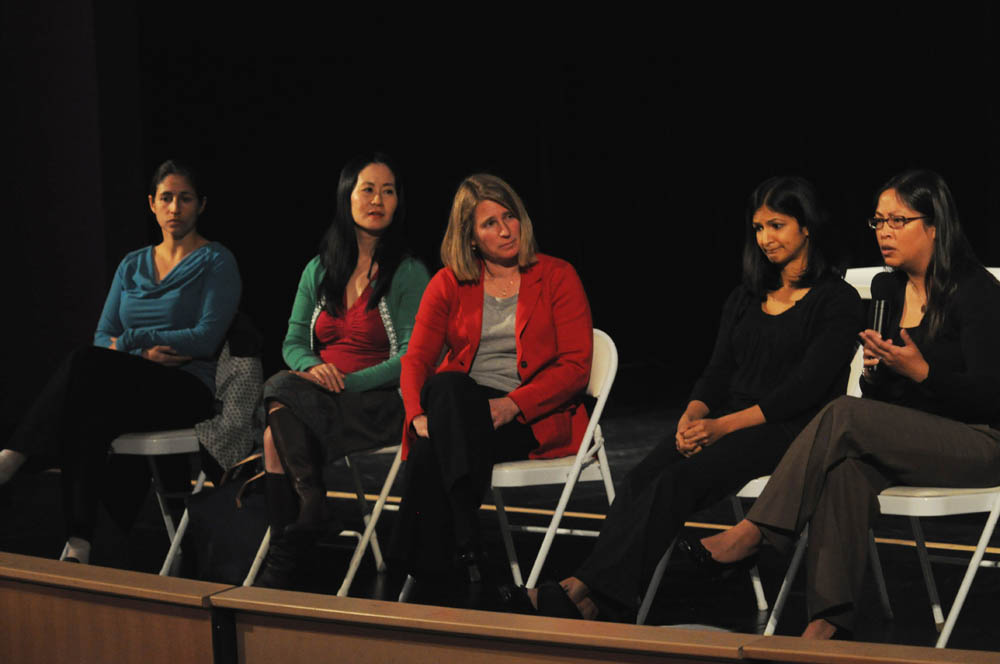
The panel: (left to right) Dina Frid, Carol Wong, Gaby Silverstein, Annmarie Hulette, and Cynthia Medina.
On the evening of Jan. 16, the Aragon Asian Parent Group (AAPG) held a workshop in the Aragon theatre to discuss characteristics associated with child well-being and mental health. On stage, a panel comprised of psychologist Carol Wang, psychiatrist Dina Frid, marriage and family therapist Gaby Silverstein, neuropsychologist Cynthia Medina, and psychologist Annmarie Hulette shared expert advice and took questions from parents in the audience.
Originally, AAPG co-president Darrick Lam had planned for the meeting to shed light on mental health.
“The original plan was to create a forum so parents could learn about tell-tale signs of conditions like depression or OCD [obsessive-compulsive disorder]. It happens more and more in our complex society, and many people, especially those of Chinese culture, do not openly address the problem,” said Lam.
As the meeting took place a short three days following the loss of senior Tyler Neeley, many parents voiced concerns about a host of issues, ranging from methods to assist children in coping with loss to possible signs that indicate a child needs help.
Listening to the issues, the panelists took turns addressing each concern.
Following an inquiry on how a parent can help a child cope with loss, Hulette responded, “After a traumatic event, everyone’s response is unique. The best thing you can do is just say that you are there for them and allow them that space.”
While many parents discussed how they themselves dealt with loss, others inquired about how to deal with grief and how to respond to inquiries of other people.
Fray said, “Go with your gut. It’s easy to get caught up, but in the process of loss, share only what you feel comfortable sharing.”
Although loss proved to be the main topic of the evening, some parents delved into prevention, wanting to understand what signs definitively indicate a need for help.
“Monitor your child’s behavior and note any changes,” said Wang.
After one identifies change in behavior, Hulette stated, “Then, you need to watch out for three things: frequency, intensity, and duration.”
Stressing the importance of watching for change in behavior, the experts reiterated the individuality of each subject and maintained that each person deals with stimuli in different ways.
When asked about the main goals of counseling, Medina offered, “Our goal is to provide emotional support or a place to talk about problems and come up with solutions. If you are unable to continue normal functions or feel like you just need to talk to someone, we are here to help.”
Parents also voiced concerns about the use of technology, particularly the internet and social media. With the prominence of the web, teens can utilize new platforms to build connections. Unfortunately, it has come with its own set of problems. Many parents feel concerned over teens’ use of the internet to cry out for help. Questions ranged from methods of detection to positive ways other teens can respond to such posts.
“Unfortunately there is no fine line,” stated Frid. “Sometimes these posts serve as a journal for the user to comment and unload feelings. Sometimes it’s just raw emotion or thoughts.”
As parents articulated concerns over other teens who observe and read such posts, Frid responded, “It is not the kid’s job to worry about the situation. It is an important situation, but they need to seek someone they trust, like parent or counselor, to address the issue.”
Through this meeting, observers learned about ways to understand other individuals and key signs that others may need to seek professional help.
“I’m very thankful for the PTSO for holding this meeting,” said parent Angela An. “They did a particularly good job on stressing and emphasizing the importance of open communication.”
Recognizing the importance of the meeting’s topics, Lam has planned another meeting for September to discuss mental health.
